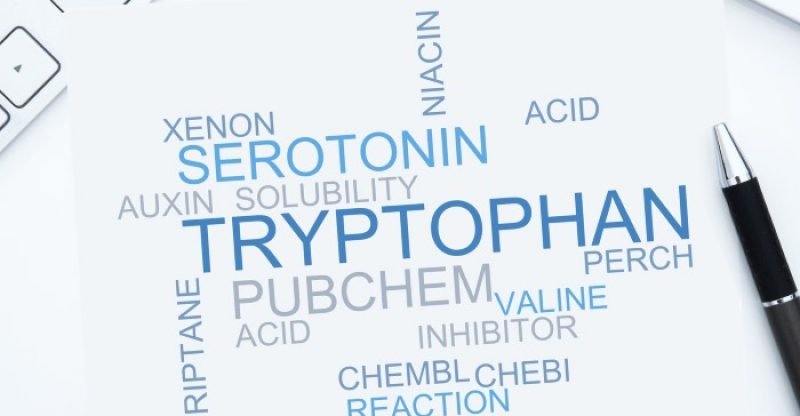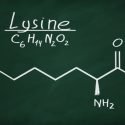8 Evidence-Based Benefits of 5-HTP (5-Hydroxytryptophan)
What is 5-HTP?
If you have been browsing the shelves of supplements at your local pharmacy or in online shops, you have probably come across 5-Hydroxytryptophan, better known as 5-HTP.
You probably asked yourself “What is 5-HTP?”
This amino acid serves as a precursor for serotonin.
It is known for a few major benefits, including reducing anxiety, alleviating depression, enhancing weight loss efforts, and providing a better night’s sleep.
It is comparable with tryptophan but has a few additional benefits.
Of course, it also has some drawbacks.
Read on to find out what 5-HTP does, and if it might be able to help you feel more relaxed and rested.
So, what is 5-HTP? As a supplement, 5-HTP comes from the Griffic simplicifolia bush, which is native to Africa.
In the human body, 5-HTP actually gets converted into serotonin in the brain, meaning that it participates in the biosynthesis of melatonin and serotonin from an amino acid known as tryptophan.
While scientists are still working to figure out what actually causes depression, it appears that diminished levels of serotonin in the brain are the culprit (1).
Health Benefits of 5-HTP
Reduces Anxiety and Panic Attacks
One of the most well-documented benefits of 5-HTP is that it has the ability to reduce the severity and frequency of anxiety and panic attacks.
Those with severe panic attacks have been found to have lower serotonin levels.
A daily supplementation of 200 mg of 5-HTP has been shown to provide a substantial amount of relief for some individuals with panic attacks (2).
One study of non-depressed youths who were reportedly in romantic distress found that, when these young people were given 5-HTP over the course of 6 weeks, (3) their platelet serotonin and brain-derived neurotrophic factor levels had both significantly increased.
Additionally, a series of clinical trials conducted on humans revealed that 5-HTP is able, at the least, to increase gamma-aminobutyric acid (GABA) receptor, agents.
(GABA is the central nervous system’s primary inhibitory agent.)
At the most, 5-HTP extracts might be able fully to increase GABA levels.
The overall result is a significant decrease in anxiety, and the promotion of a deeper state of relaxation (4).
Promotes a Better Mood
Many individuals with depression are prescribed selective serotonin reuptake inhibitors (SSRIs) in order to block serotonin from being reabsorbed within the brain.
This allows for a larger quantity of serotonin to exist within the brain, and be used for critical functions within the central nervous system.
Another one of the best-known 5-HTP benefits is that it helps to aid in the fight against depression.
In fact, studies have shown that 5-HTP has anti-depressant effects similar to those with prescribed antidepressant medications (5).
However, as one review of multiple studies of the effects of 5-HTP and tryptophan found, not enough large-scale studies have been conducted.
Studies with larger sample sizes and overall higher quality will be needed to determine just how effective 5-HTP is in treating depression (6).
There are some studies available that demonstrate how well 5-HTP can work when used synergistically with prescribed SSRIs (7, 8, 9).
In both human and rat studies, slow-release 5-HTP seems to work the most efficiently with SSRIs to elevate serotonin levels in the brain.
Of course, this should only be done under the guidance of a medical professional, as it is not yet certain just how safe it is to take simultaneously 5-HTP and an SSRI.
Another noteworthy clinical trial found that healthy male participants benefitted the most by taking a combination of antidepressants and 5-HTP.
While taking either one on its own showed a 35% to 100% boost in serotonin levels, taking the combination yielded an astonishing 500% increase in serotonin (10).
Again, more trials are needed, but the ones that exist show a lot of promise.
Decreases Childhood Night Terrors
Somewhere between 1% and 6% of children experience night terrors.
Night terrors are intense feelings of fear and anxiety that children experience between the third and fourth stages of non-rapid eye movement (NREM) sleep cycles.
This type of parasomnia can be caused by multiple factors, including stress, a lack of sleep, major changes in the sleep schedule, abnormal breathing patterns while sleeping, medications, mood disorders, and restless leg syndrome (RLS).
Normally, night terrors subside during adolescence.
However, alcohol has been found to trigger night terrors in adults.
Currently, there is an ongoing debate over whether parents should be giving 5-HTP to children in order to help ease night terrors.
One study from 2004 found that 5-HTP when prescribed in a 2 mg/kg dose to be taken every night before bed, decreased night terrors in children between the ages of 3 and 10 by 93.5% (11).
By the end of the 6-month trial period, 83.9% of the children studied no longer experienced night terrors.
Improves Your Sleep
5-HTP does not just benefit children who struggle with sleeping habits.
It seems also to benefit adults who could use a better night’s rest.
Any human being who lacks a consistent circadian rhythm most likely has a serotonin deficiency that is caused by a genetic mutation.
Those with sleep issues are normally recommended to take somewhere between 200 mg to 400 mg prior to bedtime, in order to get to sleep more quickly and remain asleep (12).
Some studies have found that, when an individual takes 5-HTP for an extended period of time, GABA receptors flourish, which ends up signaling serotonin.
This helps to regulate sleep cycles, leaving the individual feeling more refreshed upon waking (13).
Additionally, it appears that, when taken in combination with GABA, 5-HTP has the ability to minimize a person’s sleep onset latency (in other words, the amount of time it takes for the person to go from full alertness to the lightest stage of NREM sleep) and enhance the overall quality of sleep (14).
Aids in Weight Loss
As studies have consistently shown over time, cravings, weight, and emotional disorders are inextricably intertwined.
There appears to be a neurobiological foundation for craving unhealthy carbs like sugar.
Male bodybuilders, women struggling with weight issues, and athletes, in general, are trying 5-HTP as a way to cut unwanted carb cravings and lose weight while building muscle.
Since it is able to boost serotonin levels and decrease depression, 5-HTP has been shown to help curb unhealthy carb cravings and promote more successful attempts at losing weight (15, 16).
In one double-blind crossover study conducted on 19 obese females in the 1980’s, researchers found that those who took 5-HTP did not experience any changes related to their mood.
However, these women did see some weight loss results and experienced fewer food cravings while the drug was being administered (17).
Helps Treat Type II Diabetes
Type II diabetes and weight issues tend to go hand-in-hand.
Type II diabetes, which is the most common form of diabetes, causes problems with insulin resistance in the body.
In other words, the pancreas still makes insulin, but its cells are not able to utilize it like they need to.
When the pancreas fails to keep up with insulin production, blood sugar accumulates.
Obesity and being overweight (especially with fat in the gut area) have been known to cause insulin resistance.
Other causes can include genetics, broken beta cells, a lapse in cellular communication, and metabolic syndrome.
In 1998, a team of scientists conducted a clinical trial over the course of two weeks utilizing 25 overweight non-insulin-dependent diabetic human subjects undergoing outpatient treatment.
These individuals received either a placebo or a 750 mg per day dosage of 5-HTP each day for two weeks.
There were no dietary restrictions prescribed by the researchers.
In the end, compared to the placebo group, those who received 5-HTP noticed some significant changes.
These participants had a perceptibly-reduced intake of fat, calories, and carbs.
They also experienced weight loss and decreases in blood sugar, HbA1C, and insulin levels (18).
Boost Serotonin Levels
A spinal cord injury can happen either to the spinal cord itself or to the nerves that are attached to the end of the spinal canal.
This can lead to a major loss of physical strength in the upper body, changes in different bodily sensations and changes in the way parts of the body located below the injury site are able to function.
Another primary result can be a drop in serotonin levels, thereby leading to depressed mood.
When a spinal cord injury happens, monoamine fibers that are located in the brain stem are lost.
Monoamine fibers play a crucial role in synthesizing 5-HTP from tryptophan.
In order to understand how supplementation of 5-HTP might impact humans with spinal cord injuries, scientists studied how lab rats with simulated spinal cord injuries responded to supplemental dosages of 5-HTP (19).
The study revealed that 5-HTP supplementation in the rats being studied produced enough stimulation of serotonin.
In the end, serotonin levels returned to normal.
Combats Symptoms of Phenylketonuria
Last, but certainly not least, it is believed that 5-HTP might be able to help those with Phenylketonuria fight some of their neurological symptoms.
Phenylketonuria (which is more commonly referred to as PKU) is a rare genetic disorder that prevents the body from properly breaking down phenylalanine, causing it to build up in excess when high-protein foods are consumed (20).
In many countries, infants are screened for PKU, since it can be detected after birth.
If an infant goes undiagnosed, symptoms of PKU tend to show up within the first few months of life.
The longer symptoms are left untreated, the more serious the condition will become.
Symptoms can include intellectual disabilities, hyperactivity, and a lack of bone strength.
While studies have yet to show how 5-HTP interacts in humans, one study demonstrated that rats with PKU who received 5-HTP experienced improvements in neurological symptoms (21).
The results of the study showed that the prefrontal cortex of the brain was unable to respond to psychological challenges due to the presence of hyperphenylalaninemia and serotonin synthesis.
The introduction of 5-HTP as a supplement, however, made it possible for serotonin to be synthesized properly, thereby decreasing the severity of the neurological symptoms associated with PKU.
5-HTP Benefits over Tryptophan
Quickly Converted into Serotonin
Tryptophan is an amino acid that gets converted into 5-HTP, then into serotonin.
This essential amino acid needs to be acquired through the diet since the body does not synthesize it from any smaller substances.
Tryptophan’s two enzymes, TPH1 and TPH2, are responsible for converting tryptophan into 5-HTP but are the slowest-working enzymes in the serotonin production process (22).
Unlike tryptophan supplements, 5-HTP supplements provide consumers with a substance that is directly converted into serotonin – and only serotonin.
There is no biochemical inhibition involved in this process as there is in that of tryptophan conversion.
In other words, when taken as a supplement, 5-HTP is immediately available and ready to convert into serotonin, so that the benefits can be more readily reaped.
Converted into Serotonin
5-HTP is solely converted into serotonin.
The same cannot be said for tryptophan, as it is involved in many other processes, including protein synthesis and niacin (or vitamin B3) synthesis (from kynurenine and quinolinic acids).
If you are looking to take tryptophan strictly as a way to boost your serotonin levels, then you will likely not reap the same benefits as you would by taking 5-HTP (23).
Passes through the Blood-Brain Barrier
Unlike tryptophan, 5-HTP is easily able to pass through the blood-brain barrier.
The blood-brain barrier is a structure surrounding the brain capillaries that is made up of endothelial cells (24).
Its purpose is to regulate the fluids that exist outside of the cells.
Various diseases will often create abnormalities in how the blood-brain barrier functions.
Therefore, the blood-brain barrier is pretty restrictive in terms of how easily certain substances are able to pass through it.
Tryptophan, for example, has to compete with other substances, such as valine, tyrosine, leucine, and isoleucine.
All of these large neutral amino acids (LNAAs) have to be transported through the blood-brain barrier via LNAA receptors (25).
5-HTP does not require these receptors or rely on any other type of channel in order to help it cross the blood-brain barrier, as it can easily do so on its own.
5-HTP does not have to compete with amino acids, and serotonin itself does not cross the blood-brain barrier.
Therefore, any serotonin that can be found outside of the brain (in, for example, the heart, liver, gut, or blood platelets) does not end up getting in and intermingling with the serotonin that is already inside of the blood-brain barrier.
5-HTP is able to convert into serotonin both inside and outside of the brain, so this separation of serotonin does not present a problem.
Not Converted into Neurotoxic Metabolites
Another major benefit that 5-HTP has over tryptophan is that it is able to bypass the metabolites involved with tryptophan.
Tryptophan has been implicated in serious psychological disorders, including attention deficit hyperactivity disorder (ADHD), anxiety, depression, and schizophrenia.
This is due to the fact that tryptophan gets converted into both quinolinic and kynurenic acids (26).
If you are someone who experiences a large amount of inflammation throughout your body, the conversions from tryptophan into kynurenic and quinolinic acids likely occur more frequently in you than they do in other individuals.
Researchers have continuously linked inflammatory diseases with mood disorders and anxiety, all of which likely result from this tryptophan conversion process (27).
In fact, many of those with depression and aggression have extremely high inflammatory markers and might end up developing more serious symptoms of infections, stress-related disorders, and/or autoimmune diseases (28, 29).
It is important to note that, while 5-HTP does not get converted into these neurotoxic metabolites, an overabundance of 5-HTP could result in exacerbated serotonin levels.
Essentially, these high levels of serotonin could potentially cause a negative feedback loop that generates more of the neurotoxic metabolites.
This could cause schizophrenia, as dopamine and glutamate deficiencies that are consistently linked to schizophrenia can result from the stimulated feedback (30).
Side Effects
Impacts Those with Eosinophilia-Myalgia Syndrome
Eosinophilia-myalgia syndrome (EMS) is a disease characterized by chronic muscular pain and various flu-like symptoms and a heightened eosinophil (a type of white blood cells found in the immune system) count.
EMS has no known cure but has been attributed to the consumption of supplements containing L-tryptophan.
By August of 1990, the Centers for Disease Control (CDC) had received reports of EMS cases in all of the 50 U.S. states, Puerto Rico, and the District of Columbia.
In all, out of over 1,500 reported cases, 27 people had died after taking supplements containing L-tryptophan.
The previous November, the United States Food and Drug Administration (FDA) ran a massive recall on all supplements that contained a daily dosage of 100 mg or greater of L-tryptophan.
This recall expanded over the ensuing year and spread to other countries.
It was not until 2005 that the FDA finally discontinued its limitations on the extended usage of these supplements (31).
Anyone who already has eosinophilia should exercise extreme caution when using any substance related to tryptophan, including 5-HTP.
If you are unsure whether you might have eosinophilia, you should contact your doctor and discuss getting a complete blood count to rule out this possibility.
Might Impact Those with Serotonin Syndrome
Some individuals develop a massive build-up of serotonin in their bodies when they take certain medications, especially SSRIs and MAOIs (32).
This condition is called serotonin syndrome (33).
Serotonin syndrome can result in mild to severe symptoms, such as vomiting and diarrhea.
If you have not been taking serotonin-boosting medications or supplements for too long and experience only mild symptoms, these symptoms will usually disappear within a few days of stopping the medication/supplement.
However, prolonged use can result in serious side effects, including hallucinations, ataxia, and hypertension (34).
Studies have shown that 5-HTP or a combination of 5-HTP and an SSRI does not reportedly cause serotonin syndrome (35, 36).
Still, care should still be exercised by those who have previously experienced symptoms of serotonin syndrome.
Can Eventually Reduce Neurochemicals
Taking 5-HTP for an extended period of time might result in reductions to catecholamine neurotransmitters (dopamine, epinephrine, and norepinephrine) since they share conversion and breakdown enzymes.
Since this can intensify psychological and neurological diseases, it is recommended that 5-HTP consumption should be regulated by a licensed clinician (37).
Can Lead to Vomiting and Nausea
In addition to causing rare side-effects like migraines, heart palpitations, and hypomania, 5-HTP is known to cause nausea and vomiting.
This is due to the fact that serotonin interacts with the gut.
When serotonin sweeps through the body, intolerances result in the form of vomiting and nausea (38).
If you struggle with these types of side-effects, you might do better with taking a slow-release 5-HTP supplement (39).
Dosing
The typical recommended 5-HTP dosage is 200mg, although you might be able to titrate your dosages at a maximum of 3g per day (40).
Higher dosages are generally considered unsafe.
However, some studies on weight loss with 5-HTP have shown that a maximum of 900mg/d can be used for a two-week time-frame with the occurrence of common symptoms like nausea and vomiting (41).
Do’s and Don’ts
So, what can we take away from this article on 5-HTP? Let’s rehash a few dos and don’ts that we’ve discussed.
Do:
- Consider a combination of 5-HTP and an SSRI if you’re coping with depression and/or anxiety.
- Ask your doctor if 5-HTP might help your child with night terrors.
- Consider using 5-HTP if you have Type 2 diabetes, or wish to manage better your weight.
- Follow the recommended 5-HTP dosage.
Don’t:
- Plan on taking 5-HTP for an extended time.
- Take 5-HTP if you have eosinophilia.
- Continue taking 5-HTP if you develop serious side-effects.
- Assume 5-HTP won’t affect your other neurotransmitter levels.
FDA Compliance
The information on this website has not been evaluated by the Food & Drug Administration or any other medical body. We do not aim to diagnose, treat, cure or prevent any illness or disease. Information is shared for educational purposes only. You must consult your doctor before acting on any content on this website, especially if you are pregnant, nursing, taking medication, or have a medical condition.
HOW WOULD YOU RATE THIS ARTICLE?






